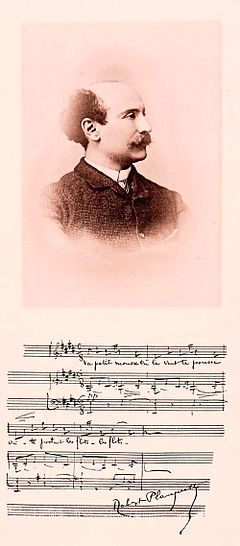Robert Planquette

(album leaf with photo portrait and autograph musical quotation)
Jean Robert Planquette (31 July 1848 – 28 January 1903) was a French composer of songs and operettas.
Several of Planquette's operettas were extraordinarily successful in Britain, especially Les cloches de Corneville (1878), the length of whose initial London run broke all records for any piece of musical theatre up to that time. Rip Van Winkle (1882) also earned international fame.
Life and career
The son of a singer, Planquette was born in Paris and educated at the Paris Conservatoire. He did not finish his studies, lacking the funds to do so, and worked as a café pianist and composer and singing (he was a tenor). A few romances that he composed brought less fame than did his song, "Sambre et Meuse", first sung in 1867 by Lucien Fugère, who went on to be one of the foremost French opera singers of his day.
In 1876, the director of the Théâtre des Folies-Dramatiques gave Planquette a commission to compose his first operetta, Les cloches de Corneville. It opened in Paris in 1877, running for an extremely successful 480 performances, and then enjoyed an astonishing London run, beginning in 1878, of a record-breaking 708 performances. Planquette's music has been praised for its pathos and romantic feeling. Le Chevalier Gaston was produced in 1879 with little success. In 1880 came Les Voltigeurs du 32ieme which had a long run in London in 1887 as The Old Guard, and La Cantiniére, which was translated into English as Nectarine, though never produced.
In 1882
Another Planquette composition, the march
Works
All operettas and all premieres in Paris, unless otherwise noted.
- Méfie-toi de Pharaon, one act, 1872, Eldorado
- Le serment de Mme Grégoire, 1874, Eldorado
- Paille d'avoine, one act, 12 March 1874, Théâtre des Délassements-Comiques
- Le valet de coeur, saynète, one act, 1875, Alcazar d'Eté
- Le péage, c 1876, Eldorado
- Les cloches de Corneville, opéra comique, four acts, 19 April 1877, Théâtre des Folies-Dramatiques
- Le chevalier Gaston, one act, 8 February 1879, Opéra, Monte Carlo
- Les voltigeurs de la 32ème, three acts, 7 January 1880, Renaissance
- La cantinière, three acts, 26 October 1880, Théâtre de Nouveautés
- Comedy Theatre, London
- Les chevaux-légers, one act, 1882
- Avenue Theatre, London
- La crémaillere, three acts, 28 November 1885, Nouveautés
- Surcouf, three acts, 6 October 1887, Folies-Dramatiques
- Captain Thérése, 1887, three acts, 25 August 1890, Prince of Wales Theatre, London
- La cocarde tricolore, three acts, 12 February 1892, Folies-Dramatiques
- Le talisman, three acts, 20 January 1893, Théâtre de la Gaîté
- Les vingt-huit jours de Champignolette, 17 September 1895, République
- Panurge, 1895, three acts, 22 November 1895, Gaîté
- Mam'zelle Quat'sous, four acts, 19 April 1897 Gaîté
- Le fiancé de Margot, one act, 1900
- Le paradis de Mahomet, three acts, completed by Louis Ganne, 15 May 1906, Variétés
Sources
- This article incorporates text from a publication now in the public domain: Chisholm, Hugh, ed. (1911). "Planquette, Robert". Encyclopædia Britannica. Vol. 21 (11th ed.). Cambridge University Press.
- Sadie, S. (ed.) (1980) The New Grove Dictionary of Music & Musicians, [vol. # 14].
- Obituary for Robert Planquette in The Musical Times, Vol. 44, No. 721 (Mar. 1, 1903), p. 177
External links
- Robert Planquette on data.bnf.fr
- Information about Planquette and Les Cloches de Corneville
- Dickson Experimental Sound Film brief discussion of film's recovery and restoration, with downloadable version of the film; part of the Internet Archive
- Free scores by Robert Planquette at the International Music Score Library Project (IMSLP)

